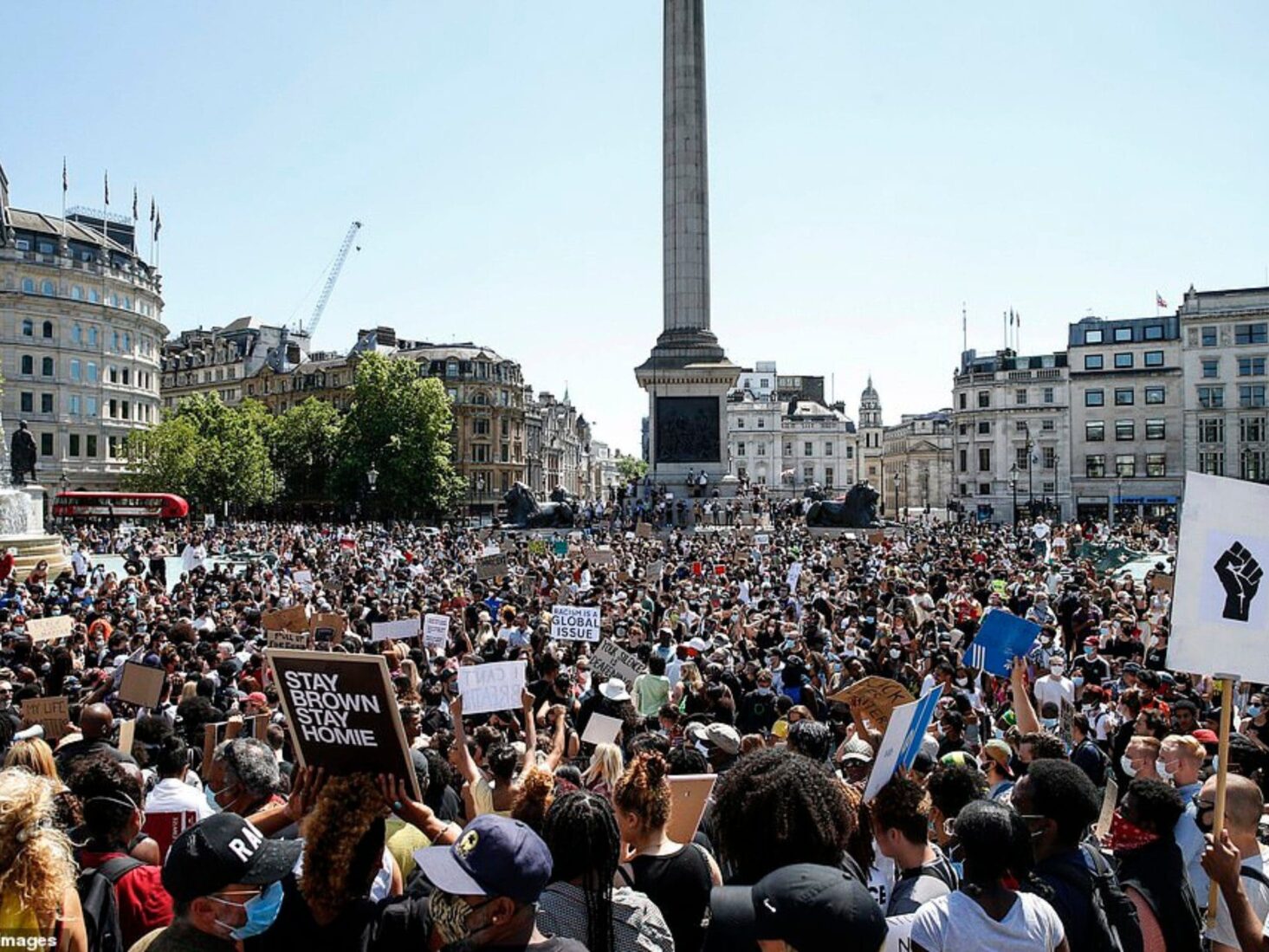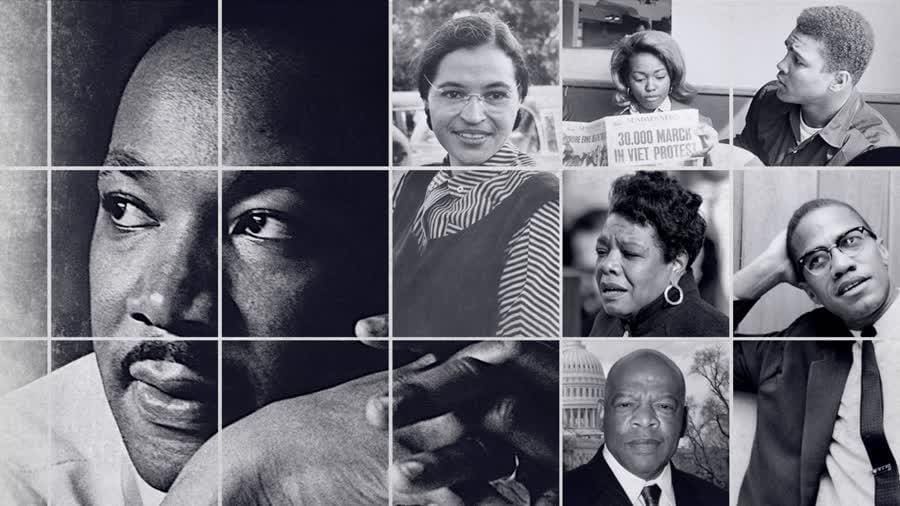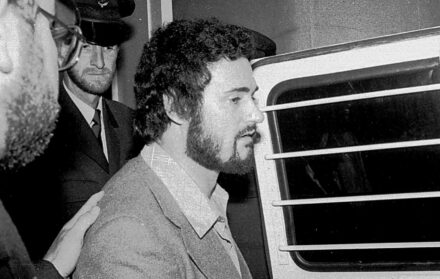
Powerful documentaries that take an unflinching look at racism, privilege and discrimination– plus how you can support essential change
Luxury London stands in solidarity with peaceful demonstrators across the globe
400 Years Taking the Knee (2000)
It started with the NFL’s Colin Kaepernick, a quarterback for the San Francisco 49ers’, who chose to kneel during the US national anthem on 26 August 2016 in protest against the unfair treatment of black Americans. It has since become a global symbol of unification in the fight against racism, a gesture mirrored across the sporting spectrum.
As part of Black History Month, Sky History is presenting a two-part documentary that covers 400 years of intertwining British and American histories, beginning with the European slave trade and continuing to the struggle for equality today. Presented by writer, publisher and BBC radio presenter Dotun Adebayo, and focusing on historic individuals who fought and struggled against colonialism, slavery and their legacies, 400 Years Taking the Knee revisits each stage of the plight towards breaking down the systems of oppression.

Watch on sky.com
The Black Power Mixtape 1967-1975 (2011)
The Black Power Mixtape 1967-1975 unearths a trove of rare footage, shot by a group of Swedish journalists documenting the Black Power Movement of the 1960s and 1970s. Assembled by Göran Olsson, it bravely captures the complex racial history of the era, with commentary from modern voices including Erykah Badu, Talib Kweli and Harry Belafonte, as well as important archival recordings of activists like Angela Davis, Stokely Carmichael and Bobby Seale. It depicts a story of valiance, defiance, hope and pride, as well as exposing the horrific brutality, frustration and defeat faced during the decade. A clip taken from the documentary of Angela Davis has been much-shared across social media, in which she states the importance of explosive, non-peaceful protest (featured below).
I Am Not Your Negro (2016)
“To be a Negro in this country and to be relatively conscious is to be in a rage almost all the time,” James Baldwin commented in 1961. “So that the first problem is how to control that rage so that it won’t destroy you.” Baldwin was a homosexual author and activist, who was an erudite voice of the American civil rights movement. This powerful, Oscar-nominated documentary, directed by Raoul Peck, brings Baldwin’s poignant words to life through the voice of Samuel L. Jackson. The narration is set against an arresting montage of archival footage, interspersed with film clips and advertising campaigns of the time. Peck’s decision to include modern recordings, including the 2014 Ferguson riots, highlights why the Black Lives Matter movement is so crucial.
When They See Us (2019)
In the month following its June 2019 release on Netflix, When They See Us was streamed by more than 23 million viewers. Incredibly powerful then, the series has taken on an added pertinence now. Based on the real-life story of five black and Hispanic teenage boys from Harlem who, in April 1989, were accused of the sexual assault of a white woman in Central Park, the four-part mini-series documents the very brutal effects of when racial prejudice leads to catastrophic miscarriages of justice in the American legal system. Equally as potent, was the follow-up Oprah Winfrey Presents: When They See Us Now, in which Oprah Winfrey talks with the exonerated five men 30 years after their original arrest, also available on Netflix.
13th (2016)
13th begins with an audio clip of President Barack Obama stating that the US has 5 per cent of the world’s population but 25 per cent of the world’s prisoners. It ends with graphic, hard-to-watch videos of fatal shootings of African-Americans by American police officers. During the 100 minutes in between, the documentary explores the intersection of race, justice and mass incarceration in the United States, highlighting the fact that from the early 1970s to the present, the rate of incarceration and the number of people in US prisons has risen dramatically, while during the same time the rate of crime has continued to decline. The film takes its name from the Thirteenth Amendment, which abolished slavery in 1865, arguing that another form of slavery has been perpetuated through the demonisation and systematic disenfranchisement of the minority poor ever since.
Let the Fire Burn (2013)
Founded in Philadelphia in 1972, MOVE is a black liberation group committed to environmental practises and animal welfare, as well as to the civil rights of African-American citizens. In 1985, after a series of altercations dating back several years, the Philadelphia police force dropped military-grade explosives onto an inner city house occupied by members of MOVE. The police opted to “let the fire burn”, resulting in the death of 11 people, including five children, and more than 60 homes. An investigation followed, which found that city leaders and law enforcement officers had acted negligently, yet no criminal charges were filed. This intense, intimate documentary, sans interviews, narration or b-roll footage, lays bare the dreadful consequences that can arise from the ill-thought and inhuman responses of law enforcement.
Crime + Punishment (2016)
Stephen Maing’s unflinching documentary focuses on a 2016 landmark lawsuit, in which 12 whistleblowing officers of colour retaliated against the New York police department’s covert and highly illegal system, which pressured cops into making arrests to meet a monthly quota – often in black communities deemed to be ‘high-crime’ areas. Maing offers an introspective look at both sides of the argument, while ultimately exposing the systematic corruption of New York’s criminal justice system.
The Death and Life of Marsha P. Johnson (2017)
This documentary on the mysterious death of black gay rights activist and Stonewall veteran Marsha P Johnson in 1992 forms the framework for a sobering look at the ongoing battle for equal rights. A prominent drag queen, Johnson was a prominent figure in the Stonewall Riots of 1969 and helped form the world’s first trans-rights organization, STAR (Street Transvestites Action Revolutionaries). When Johnson’s body is found floating in the Hudson River, a day or so after a post-mortem calculates she actually died, the NYPD declare it a suicide and refused to investigate. The Death and Life of Marsha P. Johnson questions why.
Ferguson: A Report from Occupied Territory (2015)
Taking its title from an essay written by James Baldwin during race riots in Harlem in 1966, Ferguson: A Report from Occupied Territory contextualises the 2014 murder of Mike Brown in Ferguson, Missouri, by exploring the connection between St. Louis County’s racially targeted law enforcement and the court system. Brown had been approached by a police officer for jaywalking, an offense that a subsequent investigation found accounted for one of the biggest generators of revenue for the town. The report pointed out that more than 95 per cent of those fined for jaywalking were black, and that the police department had warrants out for 16,000 individuals, primarily for minor violations such as parking and traffic violations, which were disproportionately levelled at young, black men.
How to support essential change:
Donations to the Black Lives Matter Global Network can be made here.
Sign the Change.org Justice For George Floyd Petition here.
The Runnymede Trust is a UK based race and equality think tank, which you can support here.
The Stephen Lawrence Charitable Trust was set up in memory of 18-year-old Stephen Lawrence, who was murdered by a group of white men in 1993. The trust supports young people from disadvantaged backgrounds in the UK. Read more here.









